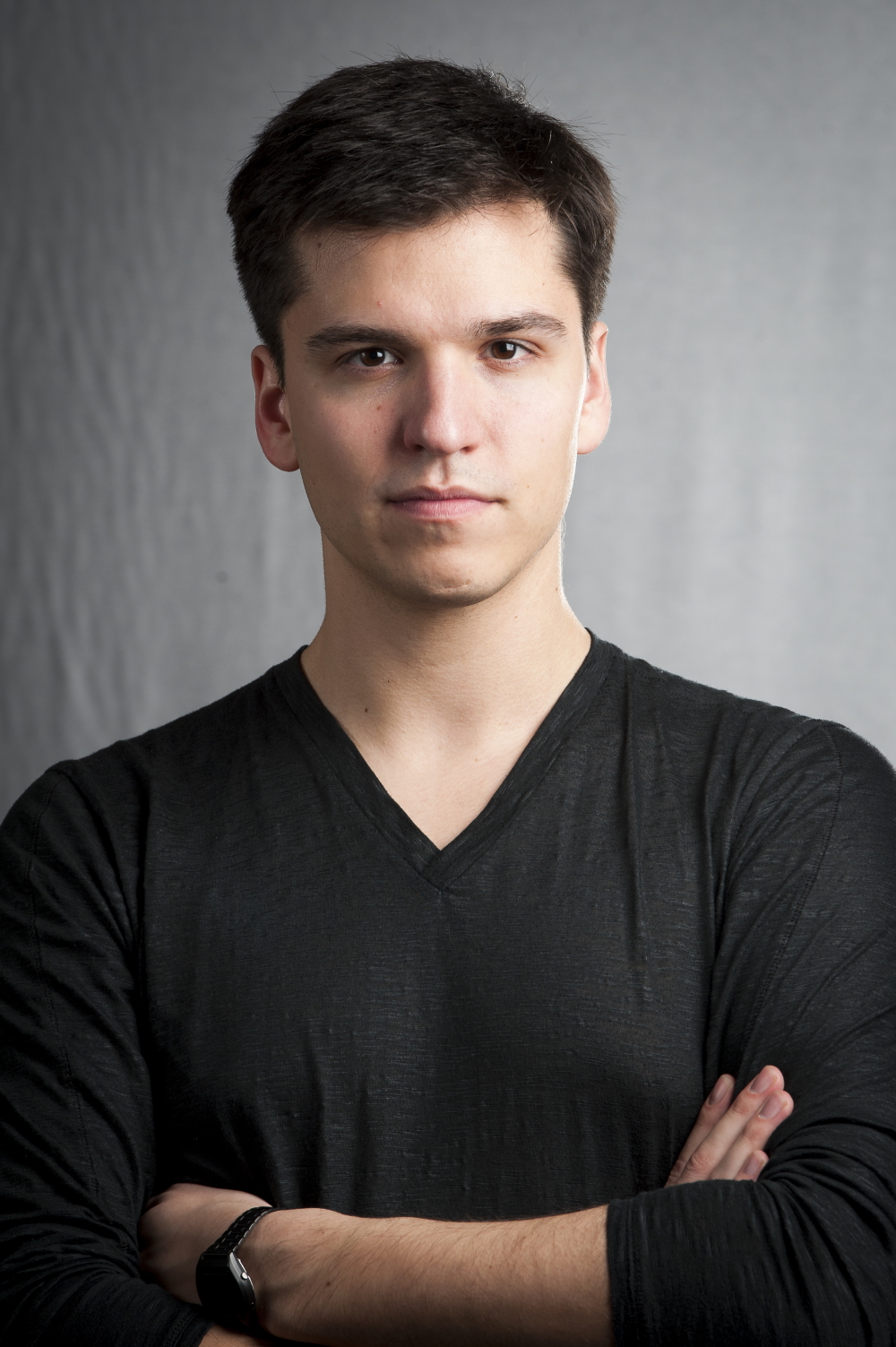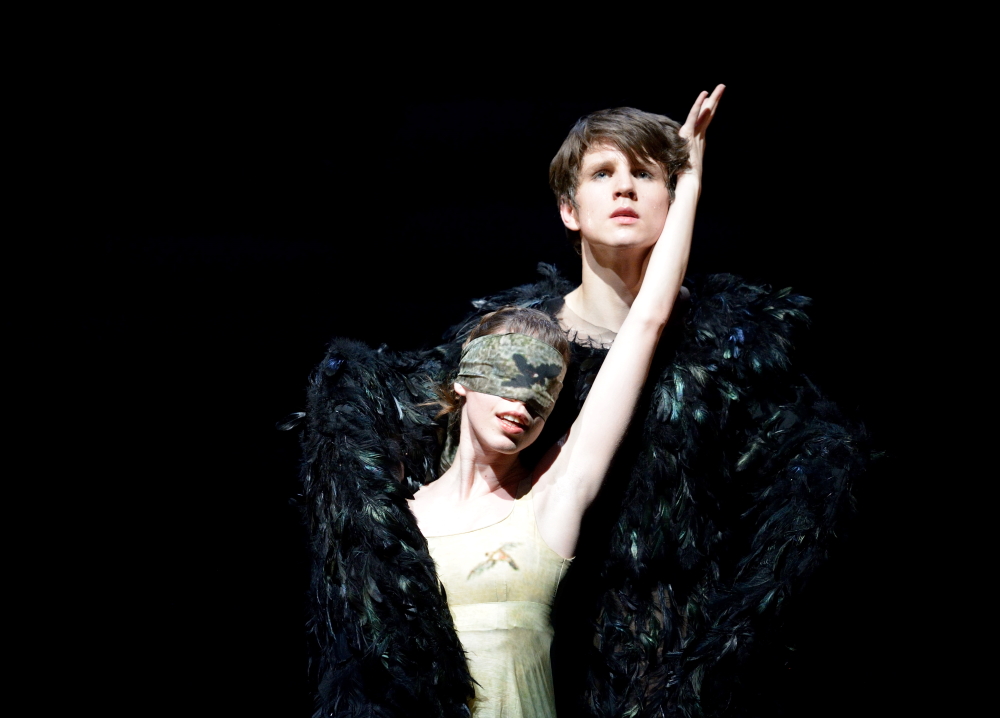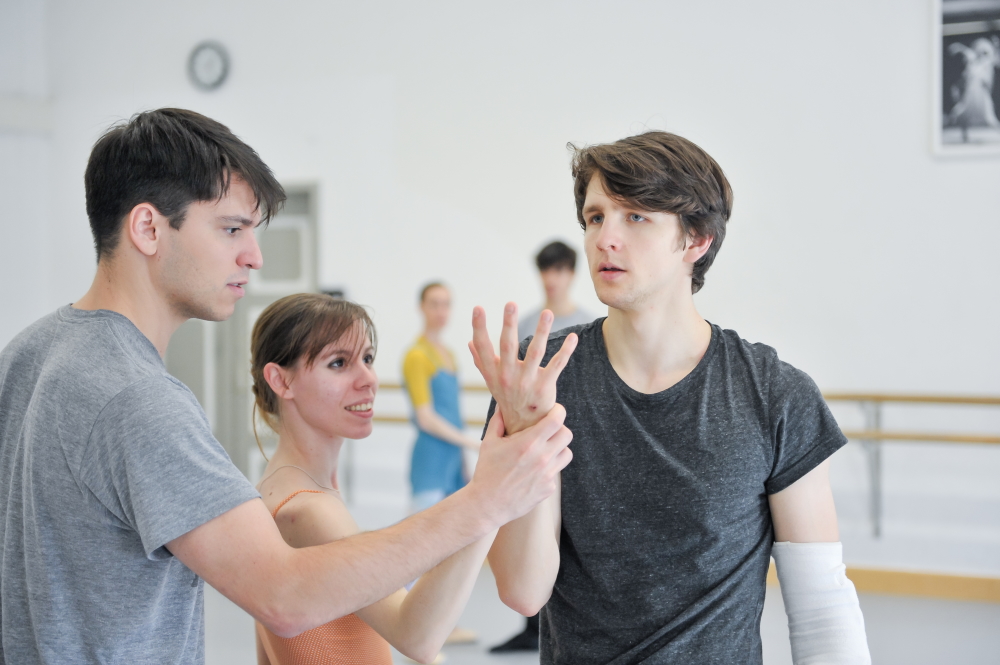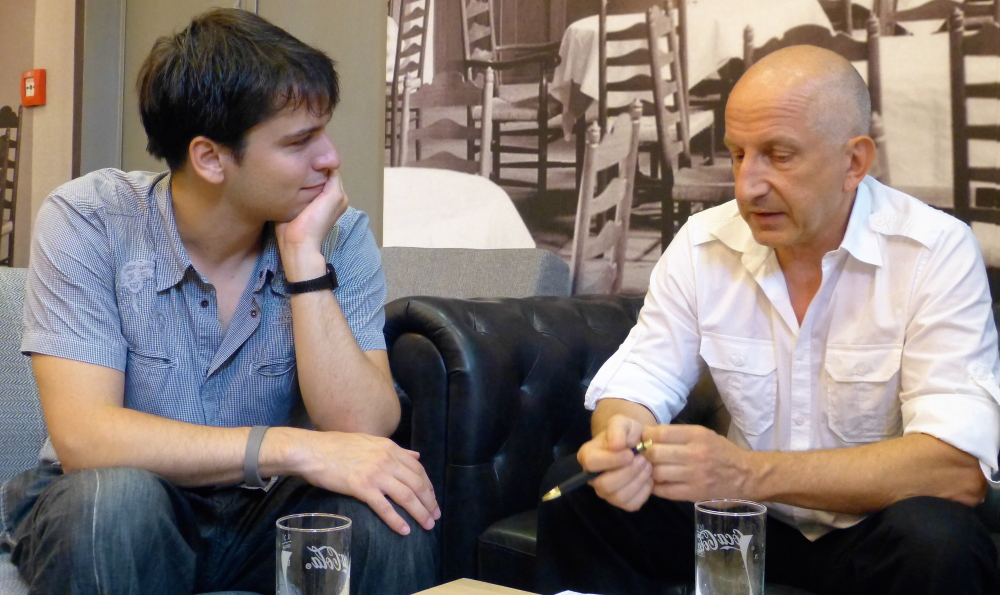Demis Volpi
choreographer
Argentina / Germany
Commissioned work for the American Ballet Theatre in New York, one of the three most important ballet companies in the USA. House choreographer at the Stuttgart Ballet, which is one of the world's leading companies. Award for the best newly created choreography at the Erik Bruhn Competition 2011 in Toronto. Award for the 'Best Dance Piece of the Year 2012' by the Chilean Art Critics Circle. 'Tanzpreis Zukunft"'(2014 awarded by Deutscher Berufsverband für Tanzpaedagogik e.V. - German Professional Association for Dance Education). Internationally, as well as in his adopted country of Germany, Argentina-born Demis Volpi is in high demand in the field of ballet.
Demis Volpi
choreographer
Argentina / Germany

Demis Volpi was born on 12 December 1985 in the province of Buenos Aires. The middle son of a wine merchant couple began his dance training at the age of four. In the following years, he was trained by the renowned ballet teacher Wilhelm Burmann as well as the Argentinean ex-dancer Andrea Candela and her compatriot, the choreographer and ballet teacher Mario Galizzi - both from the Escuela de Danza del Instituto Superior de Arte del Teatro Colón, which he also attended himself. This period was followed by two years at Canada's National Ballet School in Toronto. From 2002 to 2004 Demis Volpi trained at the Academy of the John Cranko School. In the 2004/05 season he joined the Stuttgarter Ballett as an eleve and was accepted into the corps de ballet there the following season. In 2013 Volpi ended his career as a dancer "to concentrate on a career as a choreographer." From the beginning of the 2013/14 season up until 2017, the linguistic talent (Spanish, English, German, French) has been the in-house/resident choreographer of the Stuttgarter Ballett, but the widely creative is also active beyond the region and even globally.
"Little Monsters" in Toronto won him the prize for best choreography in March 2011. Volpi, who likes to travel, read or listen to music in his spare time, caused a big stir in the scene with 'Krabat', his first big story ballet for the Stuttgart Ballet". He receives commissions from international ballet companies, including the American Ballet Theatre (New York), the Ballet de Santiago de Chile, the Latvian National Ballet"(Riga/Lettland), Ballet Nacional del Sodre in Uruguay, DanceWorks Chicago and the Royal Ballet of Flanders (Antwerp, Belgium). In the season 2020/21 Demis Volpi was the ballet-director and chief-choregrapher of the ballet at Deutsche Oper am Rhein. In Duesseldorf/Germany he got the privilege to lead a companie of his own for the first time!
Interview April 2016
Childhood dream: eleve in Argentina becomes a globally sought-after choreographer
"Intuition must be preceded by inspiration. Intuition is there to decide between given possibilities. But it is inspiration that makes something come out of nothing. I believe that inspiration is nothing other than the limitation of possibilities to a very specific minimum. Sometimes I feel inspiration as a bright moment when something clicks and suddenly makes sense. Often it is pre-existing thoughts that are recombined and connected. What exactly triggers this remains a mystery to me. Quite often these moments take place on the train while I watch the landscapes pass me by. Maybe it's an unconscious form of meditation... It feels like it's only a split second, after which I immediately start thinking, but then that's a completely different part of the process.
I often write down my ideas, but mostly my own memory is a good filter. Which thoughts, ideas or impulses have moved me in such a way that they shape and haunt me, and which ones have not? What remains is usually what triggers a greater force within me.
When the idea for a piece first appears to me, when it is suddenly there and moves me in some way, I immediately start fantasising about it: How it could come about, what meaning it has, what form it needs. This is where speed pays off, because when a thought is fresh, it generates an insane enthusiasm in me, whose wave of power I love to ride, to let it lead me naively into uncharted territory. After that, it needs time to mature. Sometimes years. Sometimes it takes time to find the right conditions for a project, sometimes you're just not ready yet. Sometimes, however, it was the case that an idea came to fruition very quickly. Interestingly, these works seemed particularly spontaneous and direct.
When I approach a piece for the first time, I usually and preferably do it alone. In the process, questions and approaches arise that can grow later when I formulate them to my team. Formulating thoughts is in itself a great way of having to voice things for the first time. This often creates a certain clarity. The team responds with questions, other perspectives and suggestions. Then there is time again to live with the piece alone until you can meet again as a team and let it grow further.
Intuition is there to decide between given possibilities. If you live with an idea long enough, you often realise at some point what potential it has. But if you let its impulse sit too long, you lose the momentum. As an artist, I don't see it as my job to evaluate my ideas, but to trust my instinct. If these ideas trigger an energy in me, then I feel them to be valid and feel obliged to realise them.
With each new piece, I have to assume that it is worth letting come into being. Otherwise I wouldn't even need to try! The greater the need to bring something to life, the better! Each time you think you've discovered something unique that deserves to live.
Sometimes I start working on a piece and have a thought that often seems too simple to be good. I keep working and try to develop that thought. Often it just gets deformed in the process. I think that the primal understanding of something is sometimes stronger and more direct than an overly thought-out idea. That again has to do with intuition.
I am firmly convinced that only when everyone involved in a production understands what it is about and thinks along with it, can the best form of realisation be achieved. A theatre is like a clock. Each cogwheel is dependent on all the others and can only fulfil its function meaningfully if all the others do the same. Each cogwheel is therefore essential and indispensable. With us, these cogswheels are people, I am one of them myself! Or perhaps I am the hand that winds the crown to set the clock in motion? In any case, my ideas can only be realised by other artists, craftsmen and staff. Once the team has a concept and a sense of direction, we present it to the different groups in the theatre. Then everyone can develop their own feeling for the piece. Of course, there always has to be follow-up, but this way everyone can contribute through their task without me having to dictate every detail. That is the motivation. The distribution of tasks is of course also an important point, but in a theatre this is already quite clearly predetermined by its structure.
My work involves collaboration with many other artists, in the conception phase as well as in the creative phase. I need people around me whom I can trust, who question the work but not me; who treat each other with patience and respect and for whom the work is more important than their personal realisation.
Intuition is part of being human. In my opinion, it is always present. It is particularly important in my work because I am always dependent on the presence of the dancers when choreographing. I have to constantly grasp their states and minds psychologically and instinctively in order to find the best way to create a spiritual and artistic connection between me and them. This is the only way I am able to free myself from physical circumstances such as a loud air conditioner or the heat of the ballet hall in order to focus only on the creative.
That is why the trust between dancer and choreographer is the real starting point of every creation. However, we have to constantly fertilise this trust and win it anew with each new challenge within a piece.
But there are always moments with dancers when I feel particularly free because I can feel them coming along without having to convince them every time. When that happens, I can concentrate my intuition, freed from everything else, solely on creating. It has always been in these moments of great trust and 'feeling at home' that I have been able to be most free and creative.
The exciting thing about my work is that it takes place in two worlds: The world without dancers, where I think about the piece either alone or as part of a team, going over it endlessly in my head and trying to look at it from all angles. A world where time can be the length of a seemingly endless, sleepless night and seems to stand still. Then there is the world with the dancers. A world that has clear rules and clock times, where the dancers have to keep their instruments, their bodies, constantly warm in order to remain ready for action; a world where time seems to flow away just by meeting these fascinating beings. Even in this second world, however, it is occasionally important to take the time to build trust, to seek the 'at home' feeling, to stop time. Both worlds need each other and complement each other wonderfully.
For artistic work, on the one hand I need quietness to be able to think thoughts through to the end, but the pressure of deadlines can also be a help, because it forces you to determine and decide things at some point. Without the time pressure, you would think forever without ever daring to take action. Without the quiet moments of reflection, the decisions one makes in the creative process would be arbitrary instead of intuitive.
Intuition is usually there even when creativity seems to disappear. Some things seem right and everything else seems wrong. This feeling is very strong in me and I can't explain where it comes from. When the muse seems to disappear, you have to look for it, dare new things and try them out. Pretty soon it turns out what is out of the question, where there is no muse; then the search for it continues.
I don't believe that experience and professionalism can replace a lack of creativity. I can say little about experience because I don't have it yet. But in the just over thirty plays I have done so far, I have noticed that I have become much more patient and that I have learned a lot about how to deal with my fellow human beings. Professionalism, that is, professional behaviour, is always part of it. If you don't have that, you should stay out! However, I think creativity cannot be faked; all ideas can only be articulated through a language. Whether that language is mathematics, architecture, music or dance, it remains a craft challenge to perform that articulation. That's where skill plays a big role.
When time pressure is too great, it's a case of working twice as hard and holding on to the craft. Creativity can't be forced, but it can be stimulated - in my case, by dealing with the piece over and over again: Reading about the subject, watching a film, visiting an exhibition or a city. Listening to music is also a great way to get new thoughts. Ambition and efficiency are important ingredients. But I think discipline is the most important element in getting things done. Because there are sometimes moments of weakness in a process, so it's important not to hide, but to work harder.
I have the feeling with every piece that I am starting from scratch, as if I had never made a piece before. The creative process feels unique to me every time. The interesting thing is that the people around me always make me aware of my patterns. Yet I feel what I am going through is new and unfamiliar. Perhaps this unconscious pattern of behaviour is my routine? I am disciplined, but not particularly routine in my everyday life.
Perfection plays no role in my creative work. A piece is like a being. Every performance also has a unique character. No being is perfect and yet it is perfect at the same time. My pieces only exist when other people take it upon themselves to bring them to life, otherwise they don't exist. And because people are beings, the perfect piece cannot exist. In dance, perfection is an illusion created by the fact that the dancer strives for it and the spectator is desperate to experience it.
An artist cannot be ahead of his time; he always creates out of his time! He may be the first to dare to go in a certain direction; but even if he is an outsider, he lives in a certain context defined by time and place.
What I strive for is the honesty, the originality and the validity of a work. It's not that I make the pieces to be innovative. I am not looking for a style of my own, it will surely emerge over time through repetitive features in my work. It is much more important for me to give each piece a true identity that belongs to that one piece only. That means each time taking the risk of having to deal with something previously unknown. It is precisely this danger that I find so exciting. I don't want to judge myself as an artist; I want to allow what I feel is right.
A piece is a living being that already mutates on its own during the course of the performances. You have to carefully follow and influence this development so that it can grow in the right direction. If a play has not been performed for a while and is performed again, there is the possibility to look at it critically again with distance and improve or update it accordingly. As long as a play is alive, the work on it does not stop.
A new creation must never be about success! It can neither be planned nor calculated. You can only be honest with yourself and pursue what you feel. The work will always appeal to one group of people and not to another. An artist has to live with that. After all, he presents himself naked to the public. That means a big risk! I see every success, whether it is a letter from an audience member or an award, as an incentive to continue my work, to develop it and to continue to have the courage to try something new.
In general, one would have to define success as such. Is it success that a piece has grown close to my vision or intention? That it appeals to a broad audience? Or that it gets good reviews? None of these three parameters is ever perfect and they contradict each other.
It has also happened that I was dissatisfied with a work and it was still successful. But the question remains: Was it really a success if it did not correspond to my artistic vision?
I think even if you don't succeed at something, you have to stand behind it and keep trying to create a dignified life for the piece. The great German costume and set designer Jürgen Rose once said during a tour of his exhibition in Munich: "You must never apologise for your work!"
I get criticism all the time in my profession and it also contradicts itself all the time. This in turn always encourages me to rely on my inner sense or instinct for 'right or wrong'. However, until now I have always had a handful of other artists whose opinions I have valued and taken to heart. Who these people are also changes in the course of one's own development. I find it very important to always create a corrective for myself that I can trust. I try to engage with the piece every time I do a new piece. Sometimes pieces ask me to do things I wouldn't otherwise do, but I have to trust the piece. Hopefully, this always results in an original piece.
During some of the performances of my plays there have been a few moments, not whole scenes, when I have thought - surprised or moved myself -: I have succeeded in this moment! Those are rather exceptions. But in the end it is what one strives for.
A few times there were also performances where there was a certain energy in the room that radiated from the stage. I knew that the other audience members felt the same way, that they felt it too. What that is remains a mystery. Evenings like that are why I keep going back to work."
My Favorite Work:
"'Krabat' is certainly my most popular play. In the course of researching youth literature for a play that should move adults as well as young people, I came across this wonderful book by Otfried Preußler. The message of his story was the incentive for me to do this play: Love will triumph over evil and free us from it."


